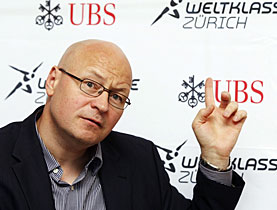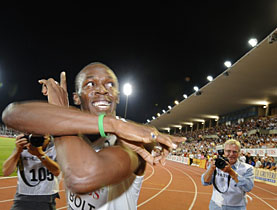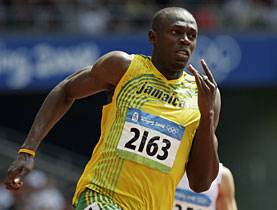“Lightning Bolt” illuminates business leaders

What lessons can triple Olympic champion Usain Bolt, the fastest man on earth, give a room of high-flying MBA business leaders?
Surprisingly, quite a few. The superstar sprinter and his coach, Glen Mills, were in Lausanne on Monday to share insights into their motivation and principles of success with a 200-strong audience at IMD business school.
“Success for me is just continuing to do great things. I am not fully successful. For me I will be a great athlete if I can do this year after year,” Bolt told the packed conference, which took place ahead of a 200-metre race at the Athletissima meeting on Tuesday evening.
But it’s not all about smashing records, Bolt said: “My standard is championships, not time records. I want to be a legend. I want people to say that I am one of the greatest athletes ever in the sport.”
The 22-year-old Jamaican was accompanied on Monday by his tough father-figure coach, Glen Mills.
“Yes, he’s a star. But when we’re on the track I’m the boss,” said Mills, who stressed that Bolt had to maintain his high standards.”He must be motivated to surpass what he has done. He hasn’t peaked yet. He has another two years before he peaks.”
Mills first saw Bolt running at the world junior championships in 2002 in Jamaica.
In front of a home crowd, 15-year-old Bolt won the 200m in 20.61sec, becoming the youngest ever world junior champion.
Learn to lose
But the transition from high school to professional was not easy. Bolt experienced a number of setbacks as a junior, in particular with poor technique and repeated injuries. The Jamaican was born with scoliosis, a curvature of the lower spine, and the increased workload played havoc with his hamstrings.
Pulling out in round one of his first Olympic Games in 2004 with an injury was met by criticism in Jamaica.
Mills started coaching Bolt in 2005 and took his young charge from being constantly injured to Olympic champion in just over two years.
“The first thing he told me was that you have to lose before you can win,” said the sprinter.
“It was important to educate him about the journey rather than the final destination,” said the coach.
“I’m a realist. You tend to be far more successful if you prepare yourself for both success and failure,” he explained. “Some coaches talk only about success. But if you are prepared for all circumstances, then you are able to deal with the situation better.”
Toughen him up
Mills changed his programme, bringing in a specialist to work on Bolt’s back, toughing up his training regime and focusing on improving his technique.
The turning point was the world championships in Osaka in 2007, where he won two silver medals.
“I came in second and afterwards coach and I sat down and analyzed the situation. The main thing was my lack of strength. I don’t like going to the gym. But I realized to get to the next level, I had to work on this weakness and spend more time in the gym,” said Bolt.
Over the years Mills has also worked on developing his mental skills.
“I taught him to visualize and always see himself winning regardless of who he competes against. If success is in your subconscious, it is a part of you. So when you see people, you see people you are going to beat. If you are nervous, you visualize failure. If you visualize winning, you have fun,” he explained.
Lessons learned
IMD professor John Weeks felt the Jamaican sprinter provided many lessons for today’s businessmen.
“Reaching the heights that Bolt has attained requires motivation, critical thinking and focus. Even more important, it requires turning early setbacks into advantages, turning weaknesses into strengths and developing the motivation required of a world champion,” he said.
Consultant Fabio Antonello agreed that it was interesting to hear from someone who had learned by going through difficult times.
“In today’s world we should put aside the fears of failure and believe in our own capabilities,” he said.
Watchmaker Olivier Randin, felt Bolt, like Roger Federer, also raised interesting questions about the mental abilities needed to become successful.
“What is the link between the mental and the physical?” he wondered. “Today everyone agrees that it’s important to have a cast-iron state of mind, but what we don’t know are the kinds of methods used to create such a condition.”
Meanwhile, Victor Trolliet, a consultant from Vevey, said Bolt’s attitude towards athletics was important.
“He said the first thing for him was running and then winning,” said Trolliet. “We [businessmen] try to win without running. We should take pleasure in daily routines, have more humour and fun, and communicate with others.”
“I don’t like the term winning – winning for what, against whom and for how much? Perhaps that’s why our system collapsed, as we were in too much of a winning climate.”
Simon Bradley in Lausanne, swissinfo.ch
Athletissima is taking place at the Pontaise Stadium in Lausanne on Tuesday July 7.
It is ranked the fifth most-important athletics meeting, according to the International Association of Athletics Federations (IAAF). The other major Swiss athletics meeting is the Weltklasse Zurich.
The new Diamond League athletics circuit will replace the Golden League from 2010.
It will comprise 14 meetings, instead of six, and include Zurich’s Weltklasse and Lausanne’s Athletissima.
Bolt will line up on Tuesday against American Shawn Crawford, the 2004 Olympic champion and runner-up last year. The men’s highlights also include: Asafa Powell (100m), Dayron Robles (110m hurdles) and Steve Hooker (pole vault). On the women side Shelly-Ann Fraser heads a strong field in the 100m, while gold medalist hurdlers Dawn Harper in the 110m and Melanie Walker in the 400m are also in action.
Usain Bolt was born on August 21, 1986 in the tiny farming community of Coxheath in the Trelawny, northern Jamaica.
He is 1.96m tall and weighs 86kg.
At the 2008 Beijing Olympics Bolt finished the 100m in 9.69 seconds and the 200m in 19.30 seconds. He also ran the third leg of the 4x100m relay, which Jamaica won in 37.10 seconds, setting three new world records in all.
He is the first sprinter to run the 100m below 9.7 seconds without wind assistance.
He takes between 40 and 41 strides to complete the 100m; in comparison bronze medallist Walter Dix takes 47.
His left shoe was untied during his record-breaking 100m.
He is the first man since Carl Lewis in 1984 to win the sprint double of both the 100m and 200m events.
He first wowed international athletics crowds at the world junior championships in 2002 in Jamaica.
In front of a home crowd, 15-year-old Bolt won the 200m in 20.61sec, becoming the youngest ever world junior champion and earning himself the Lightning Bolt nickname.
At a news conference in Lausanne on Monday Bolt said the Lausanne race would be an early test of his form. But by the end of the season he wants to challenge the world records he set in the 100m and 200m last year in Beijing. He also said that one day he would take a shot at Michael Johnson’s decade-old mark in the 400m.
He said he was mostly concerned about technique and strength at this point in the season.
He won the 100m in 9.86 seconds and the 200m in 20.25 seconds at the Jamaican national championships last month, and he ran 100m in 9.77 earlier in the season. The times were far behind his record-setting runs of 9.69 and 19.30 a year ago. But he promised to be ready to peak at the worlds championships this year.

In compliance with the JTI standards
More: SWI swissinfo.ch certified by the Journalism Trust Initiative




You can find an overview of ongoing debates with our journalists here . Please join us!
If you want to start a conversation about a topic raised in this article or want to report factual errors, email us at english@swissinfo.ch.